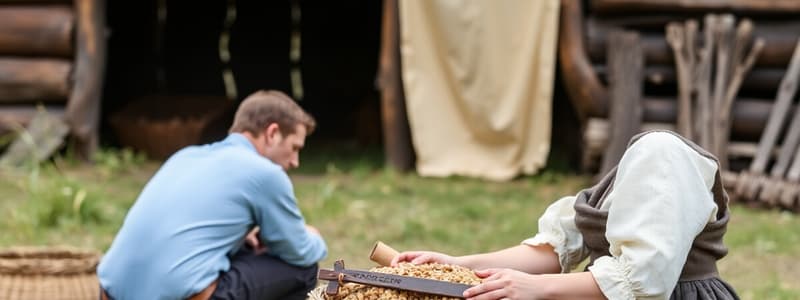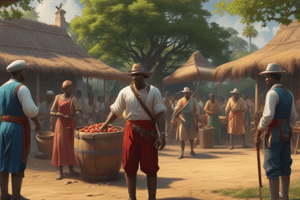Podcast
Questions and Answers
What was the primary source of heat for families living in a one-room farmhouse?
What was the primary source of heat for families living in a one-room farmhouse?
- Electric heaters
- Wood-burning stove
- Gas furnace
- Fireplace (correct)
Which tool did colonists primarily use to clear land for farming?
Which tool did colonists primarily use to clear land for farming?
- Chainsaws
- Tractors
- Axes and saws (correct)
- Shovels
What would families typically do to ensure they had enough firewood?
What would families typically do to ensure they had enough firewood?
- Collect it from surrounding woods (correct)
- Buy it from a local store
- Grow firewood trees
- Generate it with a machine
What type of bed was used for younger siblings to save space in the farmhouse?
What type of bed was used for younger siblings to save space in the farmhouse?
How did most farm families obtain the goods and services they needed?
How did most farm families obtain the goods and services they needed?
What was one of the most dangerous jobs on the farm?
What was one of the most dangerous jobs on the farm?
What was a common practice when building a house as the family grew?
What was a common practice when building a house as the family grew?
What aspect of colonial farming can we infer was crucial to their self-sufficiency?
What aspect of colonial farming can we infer was crucial to their self-sufficiency?
What was a common morning activity for families living on a farm?
What was a common morning activity for families living on a farm?
What type of goods were commonly brought to the city by ships?
What type of goods were commonly brought to the city by ships?
Which of the following activities was NOT typically performed by farm families?
Which of the following activities was NOT typically performed by farm families?
What was a common characteristic of life in colonial cities?
What was a common characteristic of life in colonial cities?
How did city homes differ from farm homes?
How did city homes differ from farm homes?
What was one reason for the small windows in city homes?
What was one reason for the small windows in city homes?
What type of professionals was found in colonial cities?
What type of professionals was found in colonial cities?
How did life on farms start compared to life in cities?
How did life on farms start compared to life in cities?
What was one of the key features of church services in New England during colonial times?
What was one of the key features of church services in New England during colonial times?
What role did the 'Captains of the Watch' play in colonial religious practices?
What role did the 'Captains of the Watch' play in colonial religious practices?
What sparked the First Great Awakening in the American colonies?
What sparked the First Great Awakening in the American colonies?
During colonial church services, what would congregants do during the midday break?
During colonial church services, what would congregants do during the midday break?
How long could colonial church services last?
How long could colonial church services last?
What was the primary purpose of the 'Seating Committee' in colonial churches?
What was the primary purpose of the 'Seating Committee' in colonial churches?
What was the significance of the First Great Awakening for colonial society?
What was the significance of the First Great Awakening for colonial society?
What would not typically occur during a Puritan church service?
What would not typically occur during a Puritan church service?
What was a common way colonists prepared vegetables in the Southern Colonies?
What was a common way colonists prepared vegetables in the Southern Colonies?
What did colonists typically eat for breakfast and dinner?
What did colonists typically eat for breakfast and dinner?
How did the colonists ensure their food would not spoil?
How did the colonists ensure their food would not spoil?
Which vegetables were commonly planted by colonists in the Southern Colonies?
Which vegetables were commonly planted by colonists in the Southern Colonies?
What significant social change influenced colonial society during this period?
What significant social change influenced colonial society during this period?
How was colonial education generally characterized outside of New England?
How was colonial education generally characterized outside of New England?
What was a factor contributing to class differences in the colonies?
What was a factor contributing to class differences in the colonies?
What was the predominant role of enslaved African Americans in colonial society?
What was the predominant role of enslaved African Americans in colonial society?
What was a common reason for colonial women to receive marriage proposals?
What was a common reason for colonial women to receive marriage proposals?
What was a notable characteristic of colonial families?
What was a notable characteristic of colonial families?
Why was life as a wife and mother often harder than life as an indentured servant?
Why was life as a wife and mother often harder than life as an indentured servant?
What contributed to the high childhood mortality rate in the colonies?
What contributed to the high childhood mortality rate in the colonies?
What influenced colonial ideas about raising children?
What influenced colonial ideas about raising children?
What commonly happened after the death of a spouse in colonial households?
What commonly happened after the death of a spouse in colonial households?
How did childhood responsibilities manifest in colonial families?
How did childhood responsibilities manifest in colonial families?
Why did households often contain stepchildren in colonial times?
Why did households often contain stepchildren in colonial times?
Flashcards are hidden until you start studying
Study Notes
Colonial Economy
- Colonists developed an economy based on farming, commerce, and handcrafts.
- Nine out of ten colonists lived on small family farms.
- Most families on farms grew or made almost everything they needed.
Colonial Farming
- Clearing land was a difficult task.
- Tools used included axes, saws, and other simple implements.
- Houses were often one room with a chimney.
Daily Life on a Farm
- Farm work began before sunrise.
- Chores included cutting wood, feeding animals, tending crops, building fences, making furniture, gathering eggs, spinning thread, weaving cloth, and sewing clothes.
- Cooking was dangerous, often done in heavy iron pots hung over open fires.
Life in Colonial Cities
- Cities were thriving centers of commerce and trade.
- The waterfront was the heart of the city.
- The marketplace was bustling with fishermen and farmers selling their goods.
- Shops lined the streets, including those of blacksmiths, shoemakers, clockmakers, silversmiths, tailors, and other craftspeople.
- Cities were noisy and smelly, with the sounds of church bells and carts, and the smells of garbage and open sewers.
- Most houses were built of wood with thatched roofs and small windows, because glass was expensive.
Colonial Religion
- Religion was an important part of colonial life.
- Children were raised reading the Bible.
- Puritans held church services in the town meetinghouse, the center of the community.
- Services could last as long as five hours.
- The First Great Awakening, a religious revival, swept through the colonies in the 1730s.
Colonial Family Life
- Families were generally large, sometimes with seven to ten children.
- Children were expected to be productive members from a young age.
- Child mortality was high, particularly in the Middle and Southern Colonies.
- After a spouse's death, it was common for men and women to remarry quickly.
Colonial Cuisine
- Food was often cooked in large iron pots.
- Stew was a common dish, served with meat and herbs.
- Corn mush sweetened with milk or other ingredients was eaten for breakfast and dinner.
- Vegetables were often eaten cooked in mushy stews.
Chapter Summary
- The American colonies during the early 1700s had an economy focused on farming, commerce, and crafts.
- Farm families produced most of what they needed.
- Many trades and crafts developed in villages and cities.
- Colonists valued their rights as English citizens, including the right to participate in government.
- Colonial assemblies defined crimes and punishments, often harsh.
- Class differences were primarily based on wealth.
- Enslaved Africans had no hope of social mobility and faced a life of forced labor.
- Religion was central to life, and the First Great Awakening revived religious feeling.
- Education was limited for most colonial children, who were expected to work.
- Families were typically large, with children expected to contribute to family labor.
Studying That Suits You
Use AI to generate personalized quizzes and flashcards to suit your learning preferences.




